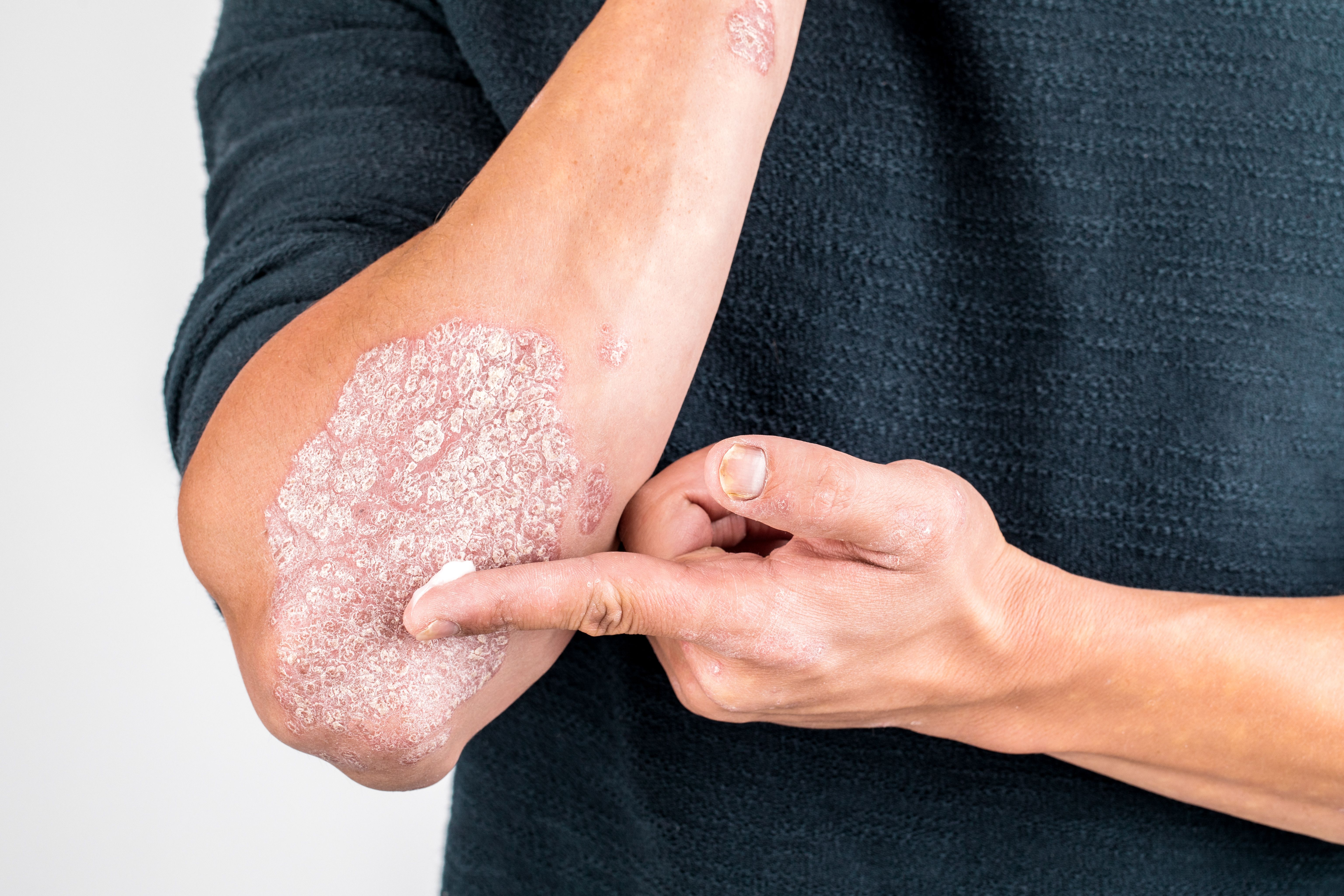- Case-Based Roundtable
- General Dermatology
- Eczema
- Chronic Hand Eczema
- Alopecia
- Aesthetics
- Vitiligo
- COVID-19
- Actinic Keratosis
- Precision Medicine and Biologics
- Rare Disease
- Wound Care
- Rosacea
- Psoriasis
- Psoriatic Arthritis
- Atopic Dermatitis
- Melasma
- NP and PA
- Skin Cancer
- Hidradenitis Suppurativa
- Drug Watch
- Pigmentary Disorders
- Acne
- Pediatric Dermatology
- Practice Management
- Prurigo Nodularis
- Buy-and-Bill
Article
Certolizumab shows highest efficacy of psoriasis self-injectables
Author(s):
The TNF alpha inhibitor certolizumab pegol has achieved the highest response rates seen in phase three trials of self-injectable biologics for psoriasis, shows a study published in JAAD.
The TNF alpha inhibitor certolizumab pegol has achieved the highest response rates seen in phase three trials of self-injectable biologics for psoriasis, according to a study published online in the Journal of the American Academy of Dermatology (JAAD).
The CIMPASI-1 and CIMPASI-2 trials showed that week 16 improvements in Psoriasis Area and Severity Index (PASI) and other measures persisted, and in some cases improved, through week 48. In pooled analysis, week 16 PASI 75 response rates for 200 mg and 400 mg doses were 76.7% and 82.0%, versus 70.7% and 83.6% at week 48.
Overall, said first author Alice Gottlieb, M.D., Ph.D., the fact that around 80 percent of patients achieved and maintained PASI 75 response makes certolizumab a highly effective TNF blocker for moderate-to-severe psoriasis. "And in combination with its FDA approval for psoriatic arthritis (PsA) – with control of signs and symptoms, inhibition of radiographic progression and improvement in quality of life – it's a strong contender when one is considering treating plaque-type psoriasis, especially in patients with psoriatic arthritis." She is professor of dermatology at New York Medical College at Metropolitan Hospital, New York.
Also at week 48, depending on study population (CIMPASI-1, CIMPASI-2 or investigators' pooled analysis) and dose, 52.7-72.6 percent of patients achieved physician global assessment (PGA) scores of clear or nearly clear (0/1), including at least a two-point improvement from baseline. PGA 0-1 response rates at week 16 ranged between 47.0 percent (200 mg, CIMPASI-1) and 71.6 percent (400 mg, CIMPASI-2). PASI 90 response rates, reported only until week 16, were 35.8-55.4 percent.
In two separate multi-site trials whose results were published in the JAAD online on April 13, 2018, investigators randomized patients with moderate-to-severe psoriasis to treatment with certolizumab 400 mg every two weeks, certolizumab 200 mg every two weeks (after 400 mg loading doses at weeks zero, two and four) or placebo. At week 16, any patients on active treatment who had achieved PASI ≥ 50 continued at their original dose through week 48. Placebo-treated patients who had achieved PASI 50-74 at week 16 switched to certolizumab 200 mg every two weeks (after loading doses). During the first 48 weeks of the ongoing study, injections were performed by study personnel who were not involved in any other study procedures.
While CIMPASI-1 results and pooled results revealed that the 400 mg dose generally performed better than 200 mg, CIMPASI-2 results showed no significant difference between the doses. In CIMPASI-1, for example, week 16 PASI 75 response rates were 66.5 percent (200 mg) and 75.8 percent (400 mg). The corresponding figures in CIMPASI-2 were 81.4 percent and 82.6 percent.
Investigators could not explain why CIMPASI-2 showed no significant differences between the two certolizumab doses, said Dr. Gottlieb. "Several demographic and baseline clinical characteristic differences between the two studies were observed," wrote Gottlieb a et al. "However, there is no clear evidence to indicate these differences affected clinical outcomes across the studies." Also in in CIMPASI-2, the placebo response rate (11.6 percent) was higher than in CIMPASI-1 (6.5 percent).
Previous studies have suggested that patients with prior biologic exposure experience lower efficacy than biologic-naïve patients do in clinical trials. In CIMPASI-1 and CIMPASI-2, however, PASI 75 and PGA 0/1 responses were similar in patients with and without prior anti-TNF biologic use, a finding that authors noted is consistent with certolizumab data in PsA trials. "It is also notable that these improvements occurred in a population with a mean body mass index (BMI) > 30, since high BMI has been an observed negative predictor of biologic response," wrote Gottlieb et al.
Regarding study shortcomings, said Dr. Gottlieb, "One has to be careful about superlatives, because there are no comparative studies with adalimumab or etanercept. And there is no psoriasis study comparing certolizumab against golimumab."
But generally, she added, "Clinical-trial populations in psoriasis have similar baseline characteristics. So that's exciting, to have a TNF blocker with a higher clinical response rate than what we've seen. And I'm very excited about the data regarding lack of placental transfer and transfer into breast milk." These data are already noted in the product's package insert. "For women of reproductive potential, that, combined with the registry data on TNF blockers, makes it in my opinion a first choice for women (with psoriasis) who want to become pregnant."
Certolizumab's safety profile In CIMPASI-1 and CIMPASI-2 was consistent with that of TNF inhibitors, the authors wrote. While the studies' combined sample size (461 patients) was smaller than populations used in prior pivotal certolizumab trials, said Dr. Gottlieb, "Certolizumab has large amounts of data in Crohn's disease, rheumatoid arthritis, ankylosing spondylitis and psoriatic arthritis, indications for which it is already approved." Hence the FDA and the drug's manufacturer UCB agreed that certolizumab's safety had already been established.
DISCLOSURES
Dermira and UCB funded CIMPASI-1 and CIMPASI-2. Dr. Gottlieb has received consulting and/or other fees from AbbVie , Allergan, Beiersdorf, Bristol-Myers Squibb, Celgene, Dermira, Incyte, Janssen, Lilly, Novartis, Reddy Labs, Sun Pharmaceutical Industries, UCB and Valeant.
REFERENCE
Gottlieb AB MD, Blauvelt A MD, Thaci D MD, et al. "Certolizumab pegol for the treatment of chronic plaque psoriasis: results through 48 weeks from two phase 3, multicenter, randomized, double-blinded, placebo-controlled studies (CIMPASI-1 and CIMPASI-2)," Journal of the American Academy of Dermatology. April 13, 2018.






